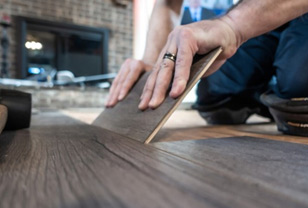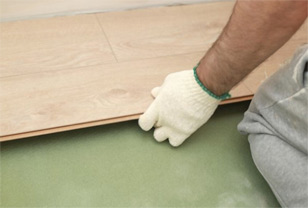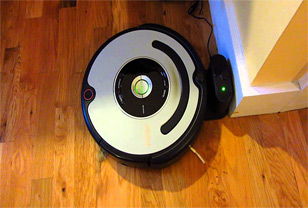Lemon Juice For Cleaning: 16 Ways To Use Lemons To Clean Your House
Introduction to cleaning with lemon
And yes, we’re talking about the golden citrus fruits that you often use for cooking delicious dishes, baking, and so on. Surprisingly, they are incredibly effective for cleaning many household objects too. But instead of the common cooking tips and facts about them, our guide will introduce you to the art of using lemons to clean your entire house.
That said, lemons consist of two amazing components that are great for cleaning purposes. First, its acidic juice is great for descaling and polishing multiple household objects, which is quite similar to the uses of vinegar. Hence, you can use it to clean stains, polish your metals, strengthen your bleach, and so on.
Plus, unlike vinegar, which can be quite annoying due to the pungent smell, lemons also offer the soothing and familiar fragrance that many of you will find enjoyable. The scent is quite strong and can help you deodorize most household objects with ease.
For those of you who are interested in using lemons to clean, our articles below offer you the complete guidebook on house cleaning with lemons.
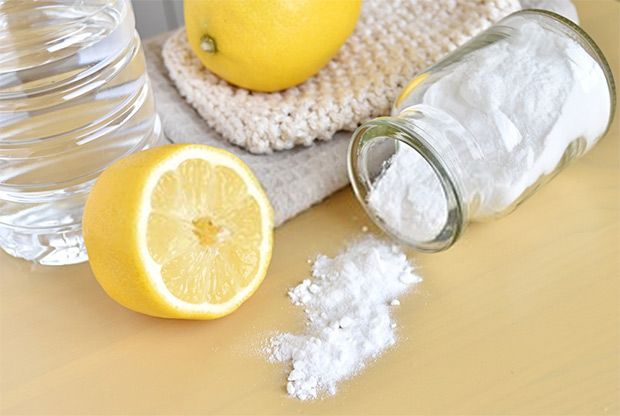
Lemon, vinegar, and baking soda are three brilliant natural cleaners
Nice and shiny toilet
Why do you need to clean your toilet?
Of all the housecleaning guides and instructions, we often find ourselves ending up in the toilet. And even though yours might look relatively clean with no stains or dirt on it, there are still millions of unseen microbes and bacteria inside. These can easily get onto your hands and other body parts if you aren’t careful. And from there, the tiny microbes can infiltrate your body and intoxicate your insides.
Not to mention that if you neglect to clean your toilet, there will also be some unwelcoming odors whenever you spend time doing your private business. This is definitely something that you want to avoid each time you use your restroom.
➜ RELATED: 50 Amazing Cleaning Tips You'll Wish You Knew Sooner
How to clean your toilet with lemon?
To prevent dirty and smelly toilets from terrorizing you and your family, it’s also possible to use lemon juice as a cleaner.
Step 1 – Use lemon and salt as cleaning products
Start by cutting a few lemons into halves, then bring them to your restroom. Squeeze out as much juice as possible on to the surfaces and the inside of the toilet. Then add a few sprinkles of coarse salt inside the toilet bowl. The acid in the lemon will help to break down hard substances on the surfaces and deal with bacteria on contact.
And by adding salt to your toilet, you’ll also increase the chances of eliminating microbes as the higher salt content in the environment will cause changes to the microbes’ body. Thus, making them less effective than usual, or even eliminating most common species with ease.
Step 2 – Clean your toilet
Wait for a couple of minutes for the cleaners to take effect then use your toilet brush to work around the inside. Do this a few times until your toilet is completely cleaned. If you find it difficult to clean certain areas of the surfaces, it’s also possible to add a few sprinkles of baking soda on top of it. Squeeze your lemon juice on top of it to speed up the reactions and make the stains come off easier.
And if you wish to go for a quicker and more direct approach, then it’s also possible to add a few sprinkles of salt directly onto the half of lemon. Squeeze it gently to release the juice while rubbing it onto the surfaces and inside of your toilet. Make sure to wear gloves to avoid getting dirt and bacteria on your hands.
Finish the cleaning by flushing all the residue and your toilet should look a lot cleaner.
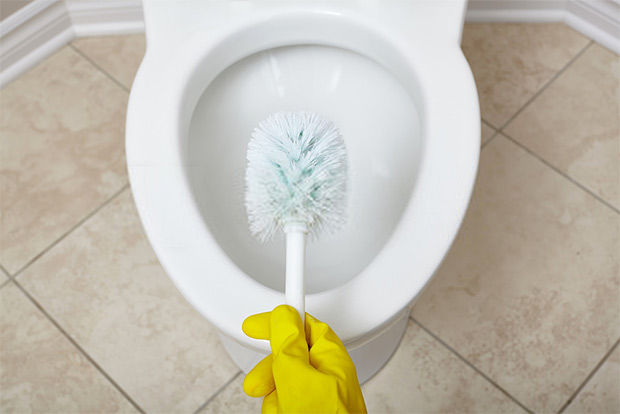
Use the toilet brush to clean after you apply the lemon cleaner
Clean off soap scum in your bathroom
Why do you need to clean soap scum and smudges?
And while you’re in your restroom, you might also notice some soap scum on the faucets, mirrors, and sink. These, while they don’t entirely cause your bathroom equipment to lose their functionality, can make them look unwelcoming and dirty. Plus, if soap scum gets on your mirrors, they will gradually make the reflected images blurry and annoying.
Having your bathroom equipment cleaned and polished regularly will maintain their look, features, and most importantly, make the entire space a lot more refreshing and inviting to use.
➜ RELATED: How To Clean Your Bathroom Like A Pro
How to clean soap scum and smudges with lemon
Who could have thought, with just a few drops of lemon juice, you can easily break through the soap scum, making them a lot easier to remove. And here is how you can use lemon juice for cleaning them.
Step 1 – Apply the lemon juice
Start by getting your lemons ready, cut them into halves and squeeze out all their juices into a big bowl. Prepare a spray bottle and fill it with lemon juice. Then proceed to the cleaning by giving your bathroom equipment a few sprays on their surfaces. These could be the tiled walls in your restroom, the enamel sink or bathtub, and of course, the mirrors.
Step 2 – Clean and polish the surfaces
Use a clean microfiber cloth or a soft sponge to work on the surfaces of the items. Give them a few wipes to get rid of the soap scum and you’ll find them disappearing relatively quickly. Finish the cleaning by using another piece of microfiber cloth to wipe off the residues.
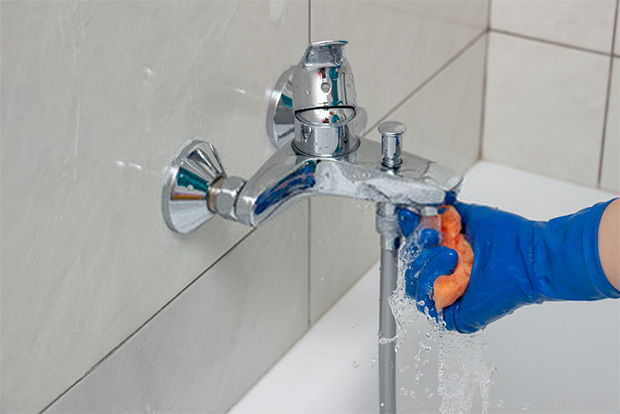
You can easily clean off soap scum with lemon juice
Clean and polish metal fixtures in your bathroom
Why do you need to clean them?
After a certain amount of time, the shiny and spotless metal fixtures in your bathroom will start to look smudgy and blurry. This is caused by grease and mineral deposits which formed an unappealing coat over your items. And if you don’t clean them very often, chances are that you’ll find yourself having a dirty and unappealing bathroom.
How to clean and polish bathroom fixtures
Like vinegar, lemon is also known for its amazing ability to clean metal fixtures. And this is due to the high content of citric acid in the juices, which can easily eliminate grease, stains, and metal deposits on their surfaces.
➜ RELATED: How To Clean With Vinegar - Amazing Remedies And Cleaning Hacks For Homeowners
Step 1 – Apply the lemon cleaner
Start with a half of a regular lemon, apply it directly on the surfaces of your metal fixtures. Gently squeeze out the juices and rub the lemon around your metals to evenly distribute. Then wait a few minutes for the juice to take effect.
Step 2 – Clean and polish the fixtures
Once the acid in the lemon has done its job of breaking down the metal deposits and cut through the grease on your fixtures, you just need to wipe off the residues with a clean microfiber cloth. Make sure to use microfiber if you’re handling delicate and well-polished surfaces to avoid scratching them.

You can clean your bathroom fixtures with lemon juice
Microwave cleaning made easy
Why do you need to clean your microwave frequently?
After a certain amount of time, your microwave will get all greasy and stained due to the foods that heat up inside of it. This makes your microwave looks extremely unhygienic and dirty. Not to mention that the food stains and remaining smells would also cause all kinds of odors inside your microwave. Thus, preventing you from using it for heating up foods and drinks. Hence, if that’s the case, then you might want to take a look at our guides on cleaning your microwave with lemon juice.
How to clean your microwave with lemon?
Like with vinegar, the acid in lemon juice is quite effective on food stains and grease. Thus, it’s possible to use lemon juice for cleaning your microwave.
Step 1 – Prepare the lemon cleaner
To begin with, you should get yourself a few lemons and cut them into even halves. Prepare a large bowl and proceed to squeeze out the juice from the lemons. Then add half a cup of water into the bowl and give the two a little mix. Put the lemon halves into the bowl as well because we can also use the skins for deodorizing.
Step 2 – Begin the cleaning
Place the bowl into the microwave and heat on high for 5 minutes. Let the bowl sit inside for a couple of minutes before taking it out. The high temperature and the steam from the mixture will get into all the corners on your microwave and help break down stains or loosen grease. Not to mention that the lemon essential oil particles would also neutralize the odors, which helps to improve the overall smell in your microwave.
Step 3 – Finish the cleaning
Once the cooking finishes, you can take out the bowl and let the inside of your microwave to cool down for about five minutes. Then proceed to use some paper towels to wipe off the residues on the inner walls of your microwave. You can expect the process to be extremely simple and easy thanks to the lemon juice cleaner.
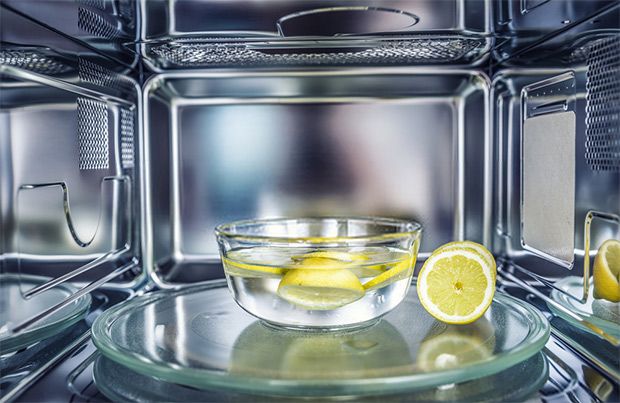
It’s easy to clean your microwave with lemon juice
No more tedious cleaning of your cheese grater
Why should you clean your cheese grater with lemon?
While we can all agree that the cheesy lasagnas, pastas, and scalloped potatoes are undoubtedly some of the most mouth-watering foods, it’s usually not the same thing when it comes to cleaning up the kitchen. And most of the time, when you use your grater to top your dishes with cheese, you’ll also find the holes being covered with cheese that wouldn’t come out easily.
How to clean your cheese grater with lemon?
And if that’s the case, then the acidic juices in lemons will prove to be extremely helpful in cleaning your grater.
Step 1 – Prepare your lemons and perform some pre-cleaning on your grater
You can start by having your grater rinsed under hot water to help soften down the cheese’s textures and clean off certain cheesy parts. Then proceed to cut a lemon into two halves and get the grater ready for your cleaning.
Step 2 – Clean your grater with lemons
Use your hand to work the lemon flesh onto the two sides of the grater. The juices will help to break down protein in cheese and the flesh will push out the remaining cheese that was stuck on your grater. Do this on both sides of your grater and don’t be afraid to use multiple halves of lemon for optimal cleaning effects.
Once you finish grating the lemon flesh and get rid of all the remaining cheese, it’s time to finish the cleaning by rinsing your grater with water. This method will help you clean up your cheese grater quickly without ruining your sponges.
Deodorize your fridge with lemon
Why do you need to deodorize your fridge?
Of all the stuff that you put inside your fridge, most of them would go bad relatively quickly at room temperature. And even with the low temperature inside, your foods could still go bad relatively quickly due to the work of the microbes. This can cause your fridge to smell bad over time and also strengthen the bacterial activities, which isn’t something that you want.
To prevent odors and microbes from poisoning your foods and to freshen up your fridge, it’s recommended that you should deodorize your fridge frequently. This would make the fridge a lot cleaner and enhance your appetite for new foods.
➜ RELATED: Need to Find the Best Vacuum Cleaner? Now You Can Get the One!
How to deodorize your fridge with lemon?
And lemon, being a great deodorizer and disinfectant would be great to deal with your smelly fridge.
Step 1 – Clean up your fridge
You should start your deodorizing process by having the fridge completely cleaned. This includes removing all the rotten foods and reorganizing the remaining items. That said, you can’t expect the lemon to magically collect all the odorous smells inside your fridge if you refuse to clean it.
Step 2 – Freshen it up with lemon
Once you’ve had your fridge properly cleaned and reorganized, you can proceed to add the lemon deodorizer. Just chop off a few slices of lemons and put them into a bowl, then place the whole thing into your fridge. The juices and oils in the lemons will help control and eliminate most of the unwelcoming smells that are causing discomfort to your nose.
Just remember to replace your lemon deodorizer frequently to avoid the smell of rotten lemons instead. To prevent the rotten lemon smell, you can also rely on the pure juice to deodorize your fridge. But this would also reduce the deodorizing effects since you won’t have that aroma from lemon essential oils to freshen things up.

You can add a few slices of lemons inside the fridge to deodorize the smells
Descale your kettle with ease
Why do you need to descale your kettle?
While it’s not contaminated or toxic as unfiltered water, our drinking water still consists of a small amount of mineral content. And as you boil up water to eliminate bacteria, scales will form up on the inner walls of your kettle, making it look somewhat dirty and unhygienic. Hence, if you’re a frequent kettle user, it’s necessary to clean up the inside to ensure your boiled water comes out clean and filtered.
How to descale your kettle with lemon?
Step 1 – Prepare the cleaner
Start by rinsing the inside of your kettle thoroughly with hot water to get rid of the unwanted residue. Then prepare a ¼ cup of lemon juice and two cups of water. Pour the mixture into your kettle and bring it to a boil.
Step 2 – Hassle-free descaling with lemon
Once the kettle automatically stops, you should leave it there for a couple of minutes before proceeding to the following steps. Pour the boiled mixture out of your kettle and you’ll find the inside walls being a lot cleaner. And the scales should come off relatively easily when you brush them with your sponge. Finish the cleaning by rinsing the inside with water.

Scales on your kettle make it look quite dirty
Clean your coffee maker with lemon juice
Why do you need to clean your coffee maker?
For those of you who’re interested in the art of making java, your coffee maker should definitely be your favorite companion. Which is why you want to keep it always in the best condition. And to achieve this, nothing is more important than having your machine properly cleaned. This ensures your coffee machines’ functionality as well as allowing you to brew delicious coffee with good consistency.
➜ RELATED: The Best Coffee Maker for Quality Brews
How to clean a coffee maker with lemon juice?
The acids in lemon juice make it slightly abrasive and can be used to descale and clean multiple stains. Hence, it’s perfect for cleaning the inside of your coffee maker, which can be quite annoying if you wish to take it apart.
Step 1 – Prepare the cleaning solution
Before you clean, it’s recommended that you empty the filters and pour all the remaining coffee grounds into the trash can. Start by getting yourself a few lemons and cut them into halves. Collect all the juice inside a large bowl and pour it inside the water tank in your coffee machine. Proceed to add two large bowls of water into the machine, then close the lid.
➜ RELATED: How To Clean Coffee Maker - Simple And Effective Ways
Step 2 – Start the cleaning
Turn on the machine and let it run for a couple of minutes until all of the lemon juice mixture is in the carafe. Notice how the color of the lemon juice cleaner has turned significantly darker. This is from the scales inside the water tank and the coffee stains on the inner walls of your machine. You can just empty the carafe then wash it with water and soap before putting it back. Repeat the steps multiple times until the machine is completely cleaned.

Your new coffee maker will get dirty over time
Easy glass & mirror cleaner
Why do you need to clean glass and mirror fixtures regularly?
After a certain amount of time, the shiny and transparent pieces of glassware or mirrors in your house would eventually turn smudgy and blurry due to the stains and dust. Hence, you might want to clean them every once in a while, to maintain their shine as well as keeping your house welcoming. And most of the time, you won’t need to use professional cleaning products, since just a small lemon can cover that up.
How to clean them with lemon?
A lot of you probably have heard of vinegar being a great cleaning product for glass and mirror, and lemon, being quite similar in cleaning applications, should definitely make it to the list of your royal cleaner family. That said, it’s possible to clean your glass and mirrors relatively quickly with pure lemon juice.
Step 1 – Get the cleaner ready
Prepare a few lemons and chop them into even halves. Then get yourself an empty plastic spray bottle to squeeze out all the juice inside. There is no need to add water since you’ll be using only lemon juice to clean your glass and mirrors.
Step 2 – Clean up your glass and mirrors
Start the cleaning by spraying a few sprinkles of the lemon cleaner on your items and fixtures. Then use a piece of microfiber cloth to wipe off the residues. The lemon will take effect relatively quickly and have your glass and mirrors cleaned quite effectively. Just keep in mind that you shouldn’t use rough cloths since they can easily damage the surfaces of your items.
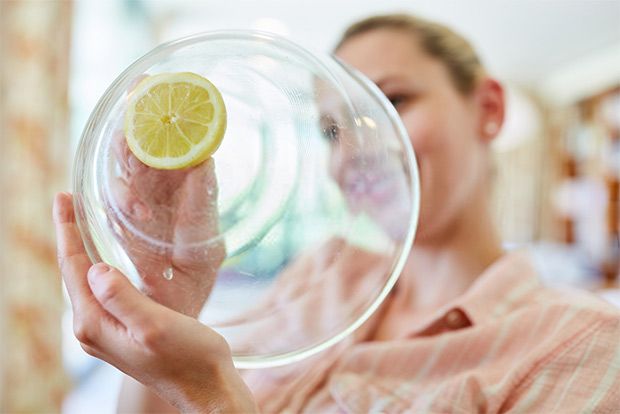
Use lemon to scrub off the stains and smudges on your glass
Clean fine metals with lemon juice
Why do you need to clean fine metal ornaments and fixtures?
After a certain amount of time, your fine metals will get covered in dirt and tarnish, these can be quite painful on the eyes, especially when you need to maintain the polished and shiny look of the items. That being said, to keep them clean and shiny, you might want to go for the ultimate cleaning solution of lemon juice.
How to clean them with lemon juice?
To deal with tarnish on your chrome, brass, or copper items, using lemon juice and salt can be quite effective. Here is how you can perform the cleaning method:
Step 1 – Get your tools and cleaner ready
You should start by having your items cleaned with warm water to get rid of the dust and stains on their surfaces. Then leave them to dry while you get the lemons ready. Cut your lemons into halves and add a few sprinkles of coarse salt on it. Then proceed to rub and squeeze the piece of lemon all over the metals. Wait for a couple of minutes before you clean to ensure the lemon juice has taken effect.
Step 2 - Polish your metals with lemon cleaner
The citric acid in the lemon will effectively work into the tarnish and force it to come off relatively quickly. And as for the coarse salt, they would also increase the scrubbing powers as you use a sponge to polish your metals.
For those that need extra cleaning power, it’s also possible to add some baking soda over the lemon juice to speed up the sizzling reactions. This would distill some of the remaining tarnish and mineral contents on the surfaces, making it easier when cleaning your metals.
Finish the cleaning by having your metals properly rinsed with warm water until all the residues have finally come off. Wipe them dry using a clean microfiber cloth and you’ll have your metals back to their shiny and polished looks.

Lemon and baking soda can help you clean and polish metals
Whiten laundry without bleach
Why should you clean laundry with lemon?
You’ve probably heard of other bleach alternatives such as baking soda or vinegar. These are all effective and can get rid of the disgusting stains on your items with ease. However, you should keep in mind that these cleaners won’t make your clothes smell better, or even worse, some people just can’t stand the pungent smell of vinegar.
By featuring the similar bleaching application and a more refreshing aroma, lemon can be used as a much more effective and comforting bleach alternative for your whites. It’s extremely useful if you don’t want to go for commercial bleaching products.
How to do this?
Step 1 – Soak your whites in lemon and water
You should start by preparing a large bucket of hot water, squeeze into it 2-4 lemons depending on the amount of clothes, then give it a good mix. Proceed to soak your whites in it overnight, make sure that you don’t include any colored laundry if you don’t want to dye your whites.
Step 2 – Wash your clothes with lemon juice
After soaking your clothes overnight, you should put them into your washing machine then add ½ cup of lemon juice before you start it. Let the machine run while you perform other cleaning tasks. Once it finishes running, you can take out your whites and let them air dry. The cleaned laundry will look extra white and smell even better with the lemony aroma on them.
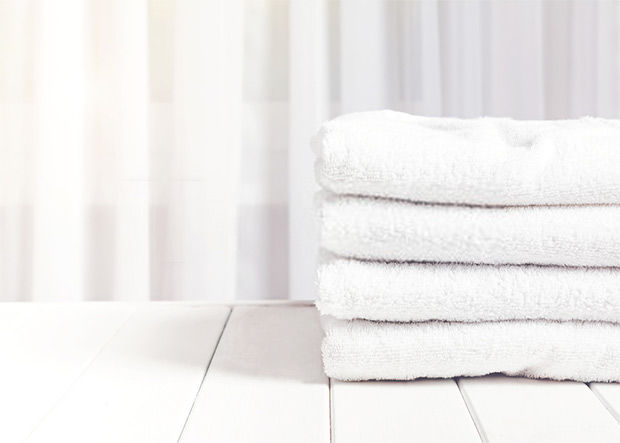
Lemon can brighten your whites
Clean up drains with lemon juice and baking soda
Why do you need to clean your drains?
After a while, the dirt and grease inside your drains will collect inside their walls, making it difficult for water to travel, and worse, nasty smells will start to appear. Hence, it’s clear that you need to clean your drains frequently if you don’t want to have a clogged and smelly stain on your sink or in the bathroom.
How to clean drains with lemon juice and baking soda?
Another way of cleaning with lemon juice is to use it in combination with baking soda to loosen the clogs inside your drains.
Step 1 – Add the baking soda
For those of you who don’t know yet, baking soda is a great cleaning product that has many applications. And by adding this to your drains, you can help loosen up and break down the gunk inside. Plus, it will also act as an odor neutralizer, which allows homeowners to suppress the horrific smells from their drains. Leave this overnight if possible or at least a few hours for the chemicals to take effect.
➜ RELATED: Baking Soda For Cleaning - The Accessible And Effective Household Cleaner
Step 2 – Add the lemon juice
And just like vinegar, lemon juice tends to react strongly to baking soda due to its acidic nature. Hence, you can make use of the sizzling reactions between the two to break down the residue in your drains. You can add a few sprinkles of baking soda into the drain the next morning then proceed to pour a cup of lemon juice to start the reactions. It’s natural to see some air bubbles coming out of the drain as it indicates the reactions are happening.
And in the meantime, you should get your kettle ready and have the water boiling hot. After a couple of minutes, you’re free to apply the hot water directly into the drain to rinse away all the remaining residues. The hot water will allow these wastes to quickly escape through the pipes.
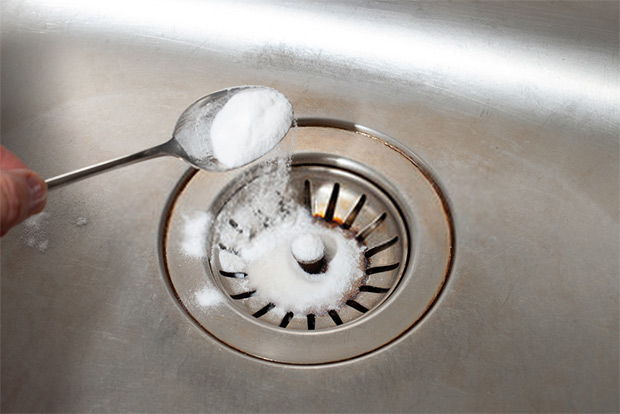
Add baking soda then lemon to clean your drains
Deodorize your cat litter
How can you get rid of the smell?
For some people, cat litter can produce many unwelcoming odors even when they’re still relatively fresh. And after your cats have spent their time in the litter boxes, the smells could even get more uncomfortable and sometimes unbearable. Hence, it’s natural that you would want to keep the odors under control with a passive method while continuing to clean the litter box frequently. And lemon, with its deodorizing effects, can help you with this certain task.
How to do this?
It’s quite simple as you can just cut a few slices of lemons and place them near your kitties’ litter boxes. The natural deodorizer can easily absorb the odors coming from the litter and prevent them from poisoning the atmosphere.
In addition, if your cats aren’t familiar with the new litter and sometimes urinate or poop on your floors, it’s also possible to get rid of the remaining smells by rubbing a few slices of lemons on to the spots. Not to mention that this would prevent your cats from using the same spot in the future.

Lemon can treat cat urine and litter smells
Make your own deodorizer solution from lemon
Why should you make your lemon deodorizer?
As it was stated in the above articles, lemon is known to be a great deodorizer. Hence, it’s also possible for you to create your own lemon deodorizer from the fruit. The product is as effective as most other commercial cleaners and won’t take long for you to make. So you can try it out whenever you have the time.
How to make it?
Step 1 – Prepare the lemon and water
Start by cutting your lemons into small slices then smash them into a grinder. Remember, you’ll be using both the juices and the oils to effectively treat smells around your house. In the meantime, have a pot of water boiled on your stove. Put all the smashed lemon peels, flesh, and juices in the boiling pot and close the lid. Turn the fire to the lowest setting and let it simmer for a couple of minutes.
Step 2 – Make your own lemon deodorizer
Once you finish boiling the mixture, you can let it rest until cool. Filter the flesh and peels out or keep them, depending on your personal preference. Then pour the deodorizer into a spray bottle and proceed to use your lemon deodorizer to treat smells on multiple parts of your home. Either spray it on your unwashed laundry to control the smells or into your shoes to prevent smells. You’ll be surprised to find the product is extremely effective.
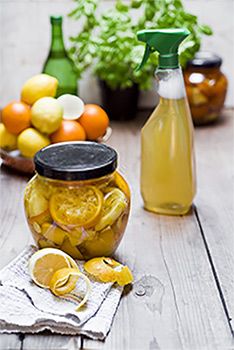
Use your lemon spray bottle to get rid of odors
Clean and shine your hair with lemon juice
Why should you use lemon juice on your hair?
In addition, for those of you who’re interested, it’s also possible to use lemon to clean and shine your hair as an alternative to shampoo. And if you’re willing to put in the time, then this natural product can even help you speed up hair growth.
How to take care of your hair with lemon juice?
Clean and shine your hair
Squeeze half a lemon into a cup then proceed to add some water to it. Then choose a conditioner of your choice and mix them together well. Then apply the mixture with your hand and massage it into the hair. Let your hair rest for a couple of minutes before rinsing in warm water. Blot your hair with a clean microfiber cloth and let it air dry.
Speed up hair growth
To strengthen your hair’s structure and speed up its growth, it’s also possible to use a mixture of lemon juice and coconut oil to massage your hair. Massage the solution into the hair then wash it again with a mild shampoo to effectively strengthen your hair and promote growth.

It’s possible to treat your hair with lemon
Eliminate body odors with lemon
Why is it possible to treat body smells with lemon?
Most of the unpleasant smells from our body come from sweat. And as the microbes work their way on humid and hidden areas, such as armpits and feet, they often cause odors as well as making your body itchy and smelly. By applying lemon juice and some salt on these areas, you can effectively eliminate the bacteria and neutralize odors. Thus, preventing the unwelcoming and embarrassing smells on your body. Here is how you should perform your body cleaning with lemon.
How to eliminate body odors with lemon juice?
Step 1 – Prepare the cleaner
You can start the cleaning by cutting your lemon into halves. Then add a few sprinkles of salt on top of the lemon halves. Make sure you clean your armpits with warm water before applying the lemon deodorizer.
Step 2 – Apply the cleaner
Squeeze and rub the whole half of the lemon onto your armpits to get rid of the smells. Leave if for a couple of minutes then rinse the whole thing with cool water. Keep in mind that after the treatment, your skin will be a lot more fragile and will need to be kept away from direct sunlight.

It’s possible to treat body odors with lemon
Conclusion
For those of you who are interested in natural cleaning products, you will certainly be surprised to find out about the amazing applications of lemons. That said, you can have access to many interesting methods and approaches when cleaning with lemon from our above articles. This would help you effectively clean up your entire house without having to use any commercial cleaning products, especially when you’re not fond of using strong chemicals.
And that’s our complete guide on how to clean with lemons. Hope you’re satisfied with the results. Thanks for reading and we’ll see you in our future posts.






